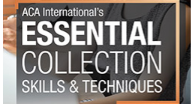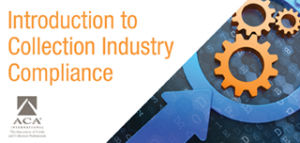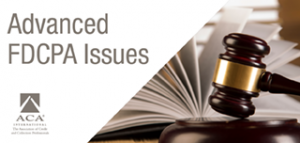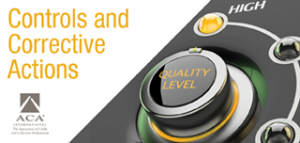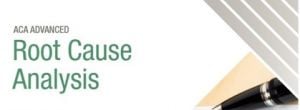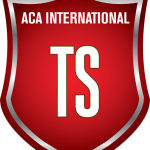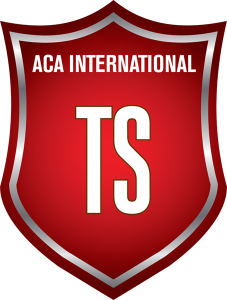ACA Education on Demand: Core Course Recordings
Recordings of our live webinars help you to pursue industry education on your own time.
Core Seminars
A Breakdown of Course Descriptions
ACA’s Core courses present the fundamental principles of collection industry compliance and business management. Core courses are designed to be compliant, objective, relevant, and ethical—precepts aligned with the ACA Code of Conduct.
ACA-certified instructors prioritize topics by “Need to Know” and “Where to Find It,” a vital breakdown for the busy professional. Using real-world scenarios, participants learn “How to Do It” using industry best practices.
Core courses are the building blocks for ACA designations. Advance your career and demonstrate your excellence in the ARM industry to clients and colleagues by proudly displaying your ACA credentials with designation badge images! Courses may also be taken outside of a designation track. We recommend that for the right experience, learners consider the category and any prerequisites when making an individual education plan.
The ACA Core library of seminars includes knowledge-based credentials, as well as those for specialty roles, such as attorneys and health care collectors, to provide education for all career stages and meet the educational requirements for ACA Designations. Times and Professional Development Units (PDUs) for the courses are listed. Times may vary for face-to-face events and online courses. Register for training events and purchase e-learning courses online.
Have questions about content or professional development credit?
IMPORTANT NOTE:
- Courses are self-reported. Please contact Member Services once you have completed a course to ensure it is verified.
ACA Core Courses Breakdown
ACA Introductory Courses
Essential Collection Skills and Techniques (ECST)
Effective communication is the cornerstone of the collection industry. Using a set of 3 Essential Collection Skills and Techniques (the “ECSTs”) and 8 call Checkpoints, this scenario-based course emphasizes positive verbal communication delivery and keen listening skills while applying professional questioning and negotiation techniques to build rapport with consumers, obtain accurate information, and overcome stalls and objections to achieving payment. (This course is also available in a self-paced e-course. Take only 1 version of the course.) Estimated time for completion: 3 hours Professional Development Unit (PDU) points: 3 Recommended pre-requisite(s): none REQUIRED FOR THE FOLLOWING ACA DESIGNATIONS:- Professional Collection Specialist (PCS)
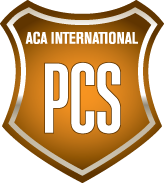
FDCPA Essentials for the ARM Industry (FDCPAE)
The Fair Debt Collection Practices Act is the primary federal law of the collection industry. Compliance success starts with understanding the consumer’s rights and your responsibilities under the FDCPA as a professional debt collector. (This course is also available in a self-paced e-course. Take only one version of the course.) This course will prepare you to:- Identify restrictions on the method and timing of collection communications.
- Determine a Right Party Contact (“RPC”) with whom you may discuss a debt and how to avoid unauthorized third-party disclosures.
- Recognize and deliver the “Mini-Miranda” disclosure to consumers and understand your duties during the 30-day Validation Period.
- Recognize and respond appropriately to consumer disputes, cease communication requests, and consumers in bankruptcy.
- Recognize and prevent prohibited practices such as harassment, abuse, false and misleading representations, and unfair or unconscionable means to collect a debt.
- Explain the consequences of violating the FDCPA for yourself and your company.
- Professional Collection Specialist (PCS)

ACA Intermediate Courses
Intermediate courses incorporate a higher degree of industry terminology, regulatory and compliance information, and business management principles.
Building High-Performing Teams
As a supervisor, it’s your responsibility is to effectively manage your most important assets: people and relationships. Gain strategies for leading a diverse team of people who will maintain efficient and effective collection practices. This course will prepare you to:- Build relationships on your team that nurture communication, collaboration, and trust.
- Create vision, purpose, and value statements with your team.
- Set strategic and shared goals that foster commitment and accountability.
- Identify the roles and work processes of your team members.
- Implement conflict resolution techniques.
- Set agreed upon ground rules for the team.
- Hold effective meetings that end with results.
- Collection Industry Professional (CIP)
- Professional Collection Manager (PCM)
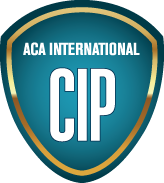
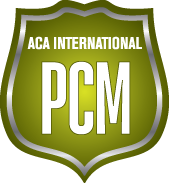
Effective Performance Management
Gain the skills you need to effectively coach and manage your team to achieve successful business results while creating a positive and motivating work environment. This course will prepare you to:- Identify Key Result Areas (KRAs) and Key Performance Indicators (KPIs).
- Write effective performance evaluations.
- Deliver effective feedback, coaching, and/or corrective action.
- Collection Industry Professional (CIP)
- Professional Collection Manager (PCM)


Ethical and Professional Collections
Whereas compliance is something you and your company may do, ethics is an internal dynamic or philosophy that can guide us on our professional journey. This course will review fundamental principles of business ethics and apply them to the collection industry. Discover and share opportunities to articulate the ACA Code of Conduct in your company mission, values, and compliance program in order to foster an ethical culture across your entire organization. This course will prepare you to:- Define ethics, values, and what it means to be a professional collector.
- Describe how agency values play a role in establishing ethical and professional business practices.
- Recognize the importance of consistent owner and management behavior with agency values.
- Interpret how ethical and professional behaviors drive agency productivity.
- Explain ACA’s Code of Conduct and the role the compliance and operations areas play to enforce ethical practices within your agency.
- Describe different ethical approaches to common scenarios in the debt collection industry.
- Develop internal compliance procedures for your agency.
- Credit and Collection Compliance Professional (CCCP)
- Credit and Collection Compliance Officer (CCCO)
- Healthcare Collection Management (HCM)
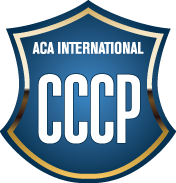
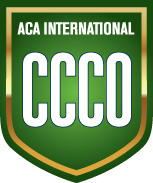
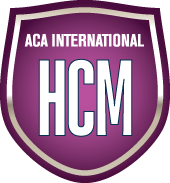
Exceptional Leadership
Being a leader presents unique challenges and opportunities. As a leader, you must understand your role as a supervisor, manage difficult situations, prioritize your roles and responsibilities and manage your time effectively. (90 minutes, .75 PDUs) This course will prepare you to:- Recognize the basic principles of effective leadership.
- Manage difficult situations appropriately.
- Prioritize your roles and responsibilities.
- Set goals and strategies for strengthening your leadership skills.
- Collection Industry Professional (CIP)
- Professional Collection Manager (PCM)


Healthcare Collection Management: Advanced Topics for the HCM Designation
Healthcare collections differ from other collection practices in many significant ways, especially when it comes to consumer care. This course will discuss the risks and benefits of healthcare collecting then dive into advanced operational topics related to healthcare collection, such as federal laws, the healthcare account lifecycle, strategies for collecting self-pay and Medicare accounts, and the basics of working with charitable providers. This course will prepare you to:- Describe the importance of understanding the patient in healthcare collections.
- Define public relations, financial assistance, and good will.
- Explore the provider-agency relationship.
- Discover different types of health insurance and payers.
- Explain how healthcare laws affect ongoing healthcare collections.
- Introduction to Collection Industry Compliance OR Understanding and Responding to the CFPB’s Expectations
- Essential Collection Skills and Techniques
- Healthcare Collection Manager (HCM)

Introduction to Collection Industry Compliance
ACA experts will guide you through the complex web of regulatory entities impacting the industry while you discover the components of the compliance lifecycle; learn what makes a strong compliance team leader and how to support a culture of compliance at your agency. Take away the ACA Compliance Checklist to help you start an effective Compliance Management System (CMS) as required by the Consumer Financial Protection Bureau. This course will prepare you to:- Identify the primary regulators and laws within the scope of the debt collection industry.
- Describe the benefits of implementing a compliance program with an effective Compliance Management System (CMS).
- Allocate talent, time, and other resources effectively by clearly defining compliance roles and responsibilities.
- Apply the three stages of the Compliance Cycle when developing a CMS.
- Use the ACA Compliance Checklist (and other resources) to plan and document compliance activities.
- Collection Industry Professional (CIP)
- Professional Collection Manager (PCM)
- Credit and Collection Compliance Professional (CCCP)



Managing the Collection Floor
This course focuses on strategies in collection floor management that help maintain compliance and foster continuous improvement. Additional strategies address efficient and effective collection practices. The ultimate goal of all the processes you manage on the collection floor is improved and measurable performance. This course will prepare you to:- Describe effective inventory management strategies.
- Operate a compliant collection floor.
- Develop key performance indicators (KPIs) to measure performance.
- Develop and understand efficient, effective, and compliant practices for the collection floor.
- Professional Collection Manager (PCM)

Successful Hiring Strategies
One of the realities of running a business is hiring great people that can perform required duties, deliver amazing customer service, and mesh with your company culture. This course will prepare you to:- Identify the right person to fill the position and objectively choose a candidate.
- Compose effective, valuable, and legal interview questions.
- Access community and online resources for recruiting.
- Collection Industry Professional (CIP)
- Professional Collection Manager (PCM)


ACA Advanced Courses
Topics are discussed in terms of Compliance Management System (CMS) requirements and risk management issues, and include analysis of case law, enforcement actions, and other events in the regulatory space. These courses may be used for advanced compliance renewal credit.
Advanced FDCPA Issues
Going beyond the basics of ACA’s FDCPA Essentials, next-level subjects such as the Bona Fide Error defense, trending court cases, and FDCPA enforcement actions are explored in this course. This awareness may help you enhance your compliance program proactively, and thus, increase your accountability for the FDCPA and other consumer protection laws. This course will prepare participants to:- Categorize liability and damages for violations of the FDCPA.
- Identify the criteria necessary to exercise a Bona Fide Error Defense.
- Track trending areas of concern in communications with consumers, debt collection practices, and applicability of the FDCPA using industry resources. Categorize liability and damages for violations of the FDCPA.
- FDCPA Essentials for the Accounts Receivable Management Industry
- Credit and Collection Compliance Professional (CCCP)
- Credit and Collection Compliance Officer (CCCO)


Conducting a Risk Assessment
Assessing risk means identifying who can be harmed and in what way(s). Could you quantify the harm that could occur if your company took no action against a threat? A sound risk assessment prepares you to create and implement a remediation plan essential to a robust Compliance Management System (CMS). This course will prepare you to:- Identify the key characteristics of an effective Compliance Management System (CMS).
- Recognize the four phases of compliance that range from proactive to reactive activities.
- Inventory potential risks.
- Calculate inherent risk, inherent severity, and residual risk using scoring models.
- Prioritize risks using a Heat Map.
- Document risk assessment activities and strategies.
- Introduction to Collection Industry Compliance OR
- Understanding and Responding to the CFPB’s Expectations
- Credit and Collection Compliance Officer (CCCO)

Controls and Corrective Actions
This course is a continuation of ACA’s Conducting a Risk Assessment course, as the processes go together. In this segment, you will take a deeper dive into the many ways in which your organization can tailor its monitoring to include appropriate controls and corrective actions. This course will prepare you to:- Create and implement remediation plans to mitigate risk.
- Evaluate your compliance management system using stages of maturity and by monitoring system operations.
- Conducting a Risk Assessment
- Credit and Collection Compliance Officer (CCCO)

Data Security and Privacy 1
Data security breaches affect millions of consumers and businesses—are you prepared? (3 hours, 3 PDUs) This introduction to data security will:- Introduce a compliance perspective focused on personal responsibility and positive behavioral change.
- Provide a core set of key terms and essential concepts pertaining to privacy and data security to set the stage for a discussion of preventive and remedial strategies.
- Explore notification laws and strategies for establishing effective policies and procedures.
- Offer practical advice for implementing effective data security and breach notification procedures in your own organization.
- Introduction to Collection Industry Compliance OR
- Understanding and Responding to the CFPB’s Expectations
- Credit and Collection Compliance Officer (CCCO)
- Healthcare Collection Manager (HCM)


Data Security and Privacy 2
In the sequel to Data Security and Privacy 1, you will explore tactics for managing the security of your company’s data in an era of mobile devices that are both company-issued and employee-owned. This course also offers a conversation about the use of social media from a compliance perspective and practical advice for handling security incidents in your own organization. To get the best experience from this course, we recommend that participants:- First complete ACA’s Data Security and Privacy I course.
- Have a working knowledge of federal and state data security breach notification laws.
- Are tasked with (a) understanding and assisting in the implementation of reasonable processes and tactics for allowing removable media and social media usage in your workplace and (b) assuring your organization is prepared to handle security incidents.
- Data Security and Privacy I
- None. May be used as renewal credit.
Duties of Data Furnishers under the FCRA
The Fair Credit Reporting Act (FCRA) and its implementing Regulation V require data furnishers to adopt reasonable policies and procedures surrounding the accuracy and integrity of their furnishing practices, to notify certain consumers prior to furnishing negative information, and to respond to consumer disputes and claims of identity theft and fraud. Consumer Reporting Agencies (CRAs) may also implement additional reporting policies, and while such policies do not amend the law, they do present additional considerations furnishers should address in a Compliance Management System (CMS) and resulting business practices.
This course will prepare participants to:
- Describe how the FCRA and Regulation V work together to prescribe regulatory requirements.
- Apply FCRA, Regulation V, and CRA accuracy and integrity standards when reporting consumer information.
- Differentiate between Direct and CRA dispute investigation requirements.
- Recognize alerts and respond to claims of identity theft and fraud.
- Certify a permissible purpose when obtaining and using consumer reports.
- Incorporate effective policies and procedures into a Compliance Management System (CMS).
Estimated time for completion: 2 hours
Professional Development Unit (PDU) points: 2
Recommended pre-requisite(s):
- Introduction to Collection Industry Compliance OR
- Understanding and Responding to the CFPB’s Expectations
REQUIRED FOR THE FOLLOWING ACA DESIGNATIONS:
- Credit and Collection Compliance Officer (CCCO)
Root Cause Analysis
Repetition is great for things like learning a new skill or following a routine for quality control. Dealing with repeat problems is tedious and frustrating. Remove the root and the problem will stop growing! Adapted from ACA’s Blueprint® system, Root Cause Analysis is a process that will guide you to the true origin of a problem. This course will prepare you to perform a Root Cause Analysis by:- Correctly identifying the known problem.
- Determining WHY the known problem occurred and categorizing the reasons.
- Analyzing the results of asking “Why?”
- Determining if the reasons why are the cause or result of the known problem.
- None. May be used for renewal credit.
Trainer Specialist (TS)
Unlock your training superpowers! In this mini-camp, you’ll explore essentials of adult learning theory and gain new insights from other compliance training heroes on how to turn “Need to Know” into fast, fun, and effective. Come for the ideas, stay for the samples, and take home the ACA Trainer Specialist designation! Upon successful completion of the three required sessions and exam, you will be able to conduct ACA’s Essentials training any time (this includes FDCPA Essentials for Collectors and Essential Collection Skills and Techniques) as part of your organization’s onboarding program or to prepare your collectors for the ACA Professional Collection Specialist (PCS) designation. THIS COURSE HAS PREREQUISITES. If you are taking the TS workshop with the intention of earning the TS designation, please refer to the requirements here.
Estimated time for completion: 4.5 hours
Professional Development Unit (PDU) points: 4.5
Recommended pre-requisite(s):
- ACA Professional Collection Specialist (PCS) designation.
REQUIRED FOR THE FOLLOWING ACA DESIGNATIONS:
- Trainer Specialist (TS)
Understanding and Responding to the CFPB’s Expectations
Using principles from ACA’s Introduction to Collection Industry Compliance, this course will describe priorities outlined in the Consumer Financial Protection Bureau’s Supervision and Examination Manual. You will also explore the examination process and ways to curate key resources for your Compliance Management System (CMS). This course will prepare you to:- Describe the impact of the CFPB’s regulatory authority and its compliance priorities.
- Identify the CFPB’s expectations for an effective Compliance Management System.
- Describe the objectives and procedures associated with a Compliance Management Review (CMR) examination by the CFPB.
- Recognize the process and expectations associated with a Civil Investigative Demand (CID).
- Introduction to Collection Industry Compliance
- Credit and Collection Compliance Officer (CCCO)

Writing Effective Policies and Procedures
Vital to any CMS, written policies, procedures, and work instructions have unique characteristics that determine when and how they should be used. During this course, you will practice writing a sample of each using defined guidelines plus take home tools and samples to jumpstart development of this critical element of the compliance lifecycle. This course will prepare you to:- Define a policy, procedure and work instruction and describe how they impact each other.
- Determine the situations in which to use a policy, procedure, or work instruction.
- Write a policy, procedure, and work instruction.
- Describe how policies, procedures and work instructions fit into the compliance cycle.
- Develop a documentation plan based on your company’s needs.
- Introduction to Collection Industry Compliance OR
- Understanding and Responding to the CFPB’s Expectations
- Credit and Collection Compliance Professional (CCCP)
- Credit and Collection Compliance Officer (CCCO)


Meet our Certified Instructors
Celebrating Mastery in the Accounts Receivable Management (ARM) Industry Through Peer Education
Certified Instructors serve as subject matter experts in the development of ACA Core courses, as well as the delivery of the courses via live webinars and in-person training for ACA members and non-member guests of our educational programs. Certified Instructors go through an extensive vetting and training process and must possess:
- Membership in good standing with ACA or an ACA employee.
- No less than five years of experience in the credit and collection industry.
- The ACA Professional Collection Specialist (PCS) designation.
- Proven experience in facilitating adult education, public speaking, and/or training.
- Attendance at ACA events.
- ACA achievements and leadership experience at the national and unit levels.
- Successful completion of ACA’s Instructor Training Academy.
Certified Instructors
Education at Your Pace
Stream a Course Any Time!
ACA’s Core courses are available on-demand. Learn online on your time.
By completing a self-paced Core course recording, you are eligible to receive Professional Development Units (PDUs) toward an ACA designation and designation renewal—just as you would attending a live session or webinar.
- Purchase access to each course individually. Once purchased, your access will expire in 60 days.
- ALL on-demand Core recordings are eligible under the ACA Training Zone. If your company has this all-access pass, simply access the course video(s) and materials anytime for the life of your Training Zone subscription for no additional fee.
- Watch the video(s) and complete the activities in the accompanying Participant Workbook. Keep a copy of the Self-Reporting Attendance Form from the Participant Workbook to track your participation. Submit to ACA with your initial designation application or renewal forms.
Core Seminars
A Breakdown of Course Descriptions
ACA’s Core courses present the fundamental principles of collection industry compliance and business management. Core courses are designed to be compliant, objective, relevant, and ethical—precepts aligned with the ACA Code of Conduct.
ACA-certified instructors prioritize topics by “Need to Know” and “Where to Find It,” a vital breakdown for the busy professional. Using real-world scenarios, participants learn “How to Do It” using industry best practices.
Core courses are the building blocks for ACA designations. Advance your career and demonstrate your excellence in the ARM industry to clients and colleagues by proudly displaying your ACA credentials with designation badge images! Courses may also be taken outside of a designation track. We recommend that for the right experience, learners consider the category and any prerequisites when making an individual education plan.
The ACA Core library of seminars includes knowledge-based credentials, as well as those for specialty roles, such as attorneys and health care collectors, to provide education for all career stages and meet the educational requirements for ACA Designations. Times and Professional Development Units (PDUs) for the courses are listed. Times may vary for face-to-face events and online courses. Register for training events and purchase e-learning courses online.
Have questions about content or professional development credit?
IMPORTANT NOTE:
- Courses are self-reported. Please contact Member Services once you have completed a course to ensure it is verified.
ACA Core Courses Breakdown
ACA Introductory Courses
Essential Collection Skills and Techniques (ECST)
Effective communication is the cornerstone of the collection industry. Using a set of 3 Essential Collection Skills and Techniques (the “ECSTs”) and 8 call Checkpoints, this scenario-based course emphasizes positive verbal communication delivery and keen listening skills while applying professional questioning and negotiation techniques to build rapport with consumers, obtain accurate information, and overcome stalls and objections to achieving payment. (This course is also available in a self-paced e-course. Take only 1 version of the course.) Estimated time for completion: 3 hours Professional Development Unit (PDU) points: 3 Recommended pre-requisite(s): none REQUIRED FOR THE FOLLOWING ACA DESIGNATIONS:- Professional Collection Specialist (PCS)

FDCPA Essentials for the ARM Industry (FDCPAE)
The Fair Debt Collection Practices Act is the primary federal law of the collection industry. Compliance success starts with understanding the consumer’s rights and your responsibilities under the FDCPA as a professional debt collector. (This course is also available in a self-paced e-course. Take only one version of the course.) This course will prepare you to:- Identify restrictions on the method and timing of collection communications.
- Determine a Right Party Contact (“RPC”) with whom you may discuss a debt and how to avoid unauthorized third-party disclosures.
- Recognize and deliver the “Mini-Miranda” disclosure to consumers and understand your duties during the 30-day Validation Period.
- Recognize and respond appropriately to consumer disputes, cease communication requests, and consumers in bankruptcy.
- Recognize and prevent prohibited practices such as harassment, abuse, false and misleading representations, and unfair or unconscionable means to collect a debt.
- Explain the consequences of violating the FDCPA for yourself and your company.
- Professional Collection Specialist (PCS)

ACA Intermediate Courses
Intermediate courses incorporate a higher degree of industry terminology, regulatory and compliance information, and business management principles.
Building High-Performing Teams
As a supervisor, it’s your responsibility is to effectively manage your most important assets: people and relationships. Gain strategies for leading a diverse team of people who will maintain efficient and effective collection practices. This course will prepare you to:- Build relationships on your team that nurture communication, collaboration, and trust.
- Create vision, purpose, and value statements with your team.
- Set strategic and shared goals that foster commitment and accountability.
- Identify the roles and work processes of your team members.
- Implement conflict resolution techniques.
- Set agreed upon ground rules for the team.
- Hold effective meetings that end with results.
- Collection Industry Professional (CIP)
- Professional Collection Manager (PCM)


Effective Performance Management
Gain the skills you need to effectively coach and manage your team to achieve successful business results while creating a positive and motivating work environment. This course will prepare you to:- Identify Key Result Areas (KRAs) and Key Performance Indicators (KPIs).
- Write effective performance evaluations.
- Deliver effective feedback, coaching, and/or corrective action.
- Collection Industry Professional (CIP)
- Professional Collection Manager (PCM)


Ethical and Professional Collections
Whereas compliance is something you and your company may do, ethics is an internal dynamic or philosophy that can guide us on our professional journey. This course will review fundamental principles of business ethics and apply them to the collection industry. Discover and share opportunities to articulate the ACA Code of Conduct in your company mission, values, and compliance program in order to foster an ethical culture across your entire organization. This course will prepare you to:- Define ethics, values, and what it means to be a professional collector.
- Describe how agency values play a role in establishing ethical and professional business practices.
- Recognize the importance of consistent owner and management behavior with agency values.
- Interpret how ethical and professional behaviors drive agency productivity.
- Explain ACA’s Code of Conduct and the role the compliance and operations areas play to enforce ethical practices within your agency.
- Describe different ethical approaches to common scenarios in the debt collection industry.
- Develop internal compliance procedures for your agency.
- Credit and Collection Compliance Professional (CCCP)
- Credit and Collection Compliance Officer (CCCO)
- Healthcare Collection Management (HCM)



Exceptional Leadership
Being a leader presents unique challenges and opportunities. As a leader, you must understand your role as a supervisor, manage difficult situations, prioritize your roles and responsibilities and manage your time effectively. (90 minutes, .75 PDUs) This course will prepare you to:- Recognize the basic principles of effective leadership.
- Manage difficult situations appropriately.
- Prioritize your roles and responsibilities.
- Set goals and strategies for strengthening your leadership skills.
- Collection Industry Professional (CIP)
- Professional Collection Manager (PCM)


Healthcare Collection Management: Advanced Topics for the HCM Designation
Healthcare collections differ from other collection practices in many significant ways, especially when it comes to consumer care. This course will discuss the risks and benefits of healthcare collecting then dive into advanced operational topics related to healthcare collection, such as federal laws, the healthcare account lifecycle, strategies for collecting self-pay and Medicare accounts, and the basics of working with charitable providers. This course will prepare you to:- Describe the importance of understanding the patient in healthcare collections.
- Define public relations, financial assistance, and good will.
- Explore the provider-agency relationship.
- Discover different types of health insurance and payers.
- Explain how healthcare laws affect ongoing healthcare collections.
- Introduction to Collection Industry Compliance OR Understanding and Responding to the CFPB’s Expectations
- Essential Collection Skills and Techniques
- Healthcare Collection Manager (HCM)

Introduction to Collection Industry Compliance
ACA experts will guide you through the complex web of regulatory entities impacting the industry while you discover the components of the compliance lifecycle; learn what makes a strong compliance team leader and how to support a culture of compliance at your agency. Take away the ACA Compliance Checklist to help you start an effective Compliance Management System (CMS) as required by the Consumer Financial Protection Bureau. This course will prepare you to:- Identify the primary regulators and laws within the scope of the debt collection industry.
- Describe the benefits of implementing a compliance program with an effective Compliance Management System (CMS).
- Allocate talent, time, and other resources effectively by clearly defining compliance roles and responsibilities.
- Apply the three stages of the Compliance Cycle when developing a CMS.
- Use the ACA Compliance Checklist (and other resources) to plan and document compliance activities.
- Collection Industry Professional (CIP)
- Professional Collection Manager (PCM)
- Credit and Collection Compliance Professional (CCCP)



Managing the Collection Floor
This course focuses on strategies in collection floor management that help maintain compliance and foster continuous improvement. Additional strategies address efficient and effective collection practices. The ultimate goal of all the processes you manage on the collection floor is improved and measurable performance. This course will prepare you to:- Describe effective inventory management strategies.
- Operate a compliant collection floor.
- Develop key performance indicators (KPIs) to measure performance.
- Develop and understand efficient, effective, and compliant practices for the collection floor.
- Professional Collection Manager (PCM)

Successful Hiring Strategies
One of the realities of running a business is hiring great people that can perform required duties, deliver amazing customer service, and mesh with your company culture. This course will prepare you to:- Identify the right person to fill the position and objectively choose a candidate.
- Compose effective, valuable, and legal interview questions.
- Access community and online resources for recruiting.
- Collection Industry Professional (CIP)
- Professional Collection Manager (PCM)


ACA Advanced Courses
Topics are discussed in terms of Compliance Management System (CMS) requirements and risk management issues, and include analysis of case law, enforcement actions, and other events in the regulatory space. These courses may be used for advanced compliance renewal credit.
Advanced FDCPA Issues
Going beyond the basics of ACA’s FDCPA Essentials, next-level subjects such as the Bona Fide Error defense, trending court cases, and FDCPA enforcement actions are explored in this course. This awareness may help you enhance your compliance program proactively, and thus, increase your accountability for the FDCPA and other consumer protection laws. This course will prepare participants to:- Categorize liability and damages for violations of the FDCPA.
- Identify the criteria necessary to exercise a Bona Fide Error Defense.
- Track trending areas of concern in communications with consumers, debt collection practices, and applicability of the FDCPA using industry resources. Categorize liability and damages for violations of the FDCPA.
- FDCPA Essentials for the Accounts Receivable Management Industry
- Credit and Collection Compliance Professional (CCCP)
- Credit and Collection Compliance Officer (CCCO)


Conducting a Risk Assessment
Assessing risk means identifying who can be harmed and in what way(s). Could you quantify the harm that could occur if your company took no action against a threat? A sound risk assessment prepares you to create and implement a remediation plan essential to a robust Compliance Management System (CMS). This course will prepare you to:- Identify the key characteristics of an effective Compliance Management System (CMS).
- Recognize the four phases of compliance that range from proactive to reactive activities.
- Inventory potential risks.
- Calculate inherent risk, inherent severity, and residual risk using scoring models.
- Prioritize risks using a Heat Map.
- Document risk assessment activities and strategies.
- Introduction to Collection Industry Compliance OR
- Understanding and Responding to the CFPB’s Expectations
- Credit and Collection Compliance Officer (CCCO)

Controls and Corrective Actions
This course is a continuation of ACA’s Conducting a Risk Assessment course, as the processes go together. In this segment, you will take a deeper dive into the many ways in which your organization can tailor its monitoring to include appropriate controls and corrective actions. This course will prepare you to:- Create and implement remediation plans to mitigate risk.
- Evaluate your compliance management system using stages of maturity and by monitoring system operations.
- Conducting a Risk Assessment
- Credit and Collection Compliance Officer (CCCO)

Data Security and Privacy 1
Data security breaches affect millions of consumers and businesses—are you prepared? (3 hours, 3 PDUs) This introduction to data security will:- Introduce a compliance perspective focused on personal responsibility and positive behavioral change.
- Provide a core set of key terms and essential concepts pertaining to privacy and data security to set the stage for a discussion of preventive and remedial strategies.
- Explore notification laws and strategies for establishing effective policies and procedures.
- Offer practical advice for implementing effective data security and breach notification procedures in your own organization.
- Introduction to Collection Industry Compliance OR
- Understanding and Responding to the CFPB’s Expectations
- Credit and Collection Compliance Officer (CCCO)
- Healthcare Collection Manager (HCM)


Data Security and Privacy 2
In the sequel to Data Security and Privacy 1, you will explore tactics for managing the security of your company’s data in an era of mobile devices that are both company-issued and employee-owned. This course also offers a conversation about the use of social media from a compliance perspective and practical advice for handling security incidents in your own organization. To get the best experience from this course, we recommend that participants:- First complete ACA’s Data Security and Privacy I course.
- Have a working knowledge of federal and state data security breach notification laws.
- Are tasked with (a) understanding and assisting in the implementation of reasonable processes and tactics for allowing removable media and social media usage in your workplace and (b) assuring your organization is prepared to handle security incidents.
- Data Security and Privacy I
- None. May be used as renewal credit.
Duties of Data Furnishers under the FCRA
The Fair Credit Reporting Act (FCRA) and its implementing Regulation V require data furnishers to adopt reasonable policies and procedures surrounding the accuracy and integrity of their furnishing practices, to notify certain consumers prior to furnishing negative information, and to respond to consumer disputes and claims of identity theft and fraud. Consumer Reporting Agencies (CRAs) may also implement additional reporting policies, and while such policies do not amend the law, they do present additional considerations furnishers should address in a Compliance Management System (CMS) and resulting business practices.
This course will prepare participants to:
- Describe how the FCRA and Regulation V work together to prescribe regulatory requirements.
- Apply FCRA, Regulation V, and CRA accuracy and integrity standards when reporting consumer information.
- Differentiate between Direct and CRA dispute investigation requirements.
- Recognize alerts and respond to claims of identity theft and fraud.
- Certify a permissible purpose when obtaining and using consumer reports.
- Incorporate effective policies and procedures into a Compliance Management System (CMS).
Estimated time for completion: 2 hours
Professional Development Unit (PDU) points: 2
Recommended pre-requisite(s):
- Introduction to Collection Industry Compliance OR
- Understanding and Responding to the CFPB’s Expectations
REQUIRED FOR THE FOLLOWING ACA DESIGNATIONS:
- Credit and Collection Compliance Officer (CCCO)
Root Cause Analysis
Repetition is great for things like learning a new skill or following a routine for quality control. Dealing with repeat problems is tedious and frustrating. Remove the root and the problem will stop growing! Adapted from ACA’s Blueprint® system, Root Cause Analysis is a process that will guide you to the true origin of a problem. This course will prepare you to perform a Root Cause Analysis by:- Correctly identifying the known problem.
- Determining WHY the known problem occurred and categorizing the reasons.
- Analyzing the results of asking “Why?”
- Determining if the reasons why are the cause or result of the known problem.
- None. May be used for renewal credit.
Trainer Specialist (TS)
Unlock your training superpowers! In this mini-camp, you’ll explore essentials of adult learning theory and gain new insights from other compliance training heroes on how to turn “Need to Know” into fast, fun, and effective. Come for the ideas, stay for the samples, and take home the ACA Trainer Specialist designation! Upon successful completion of the three required sessions and exam, you will be able to conduct ACA’s Essentials training any time (this includes FDCPA Essentials for Collectors and Essential Collection Skills and Techniques) as part of your organization’s onboarding program or to prepare your collectors for the ACA Professional Collection Specialist (PCS) designation. THIS COURSE HAS PREREQUISITES. If you are taking the TS workshop with the intention of earning the TS designation, please refer to the requirements here.
Estimated time for completion: 4.5 hours
Professional Development Unit (PDU) points: 4.5
Recommended pre-requisite(s):
- ACA Professional Collection Specialist (PCS) designation.
REQUIRED FOR THE FOLLOWING ACA DESIGNATIONS:
- Trainer Specialist (TS)
Understanding and Responding to the CFPB’s Expectations
Using principles from ACA’s Introduction to Collection Industry Compliance, this course will describe priorities outlined in the Consumer Financial Protection Bureau’s Supervision and Examination Manual. You will also explore the examination process and ways to curate key resources for your Compliance Management System (CMS). This course will prepare you to:- Describe the impact of the CFPB’s regulatory authority and its compliance priorities.
- Identify the CFPB’s expectations for an effective Compliance Management System.
- Describe the objectives and procedures associated with a Compliance Management Review (CMR) examination by the CFPB.
- Recognize the process and expectations associated with a Civil Investigative Demand (CID).
- Introduction to Collection Industry Compliance
- Credit and Collection Compliance Officer (CCCO)

Writing Effective Policies and Procedures
Vital to any CMS, written policies, procedures, and work instructions have unique characteristics that determine when and how they should be used. During this course, you will practice writing a sample of each using defined guidelines plus take home tools and samples to jumpstart development of this critical element of the compliance lifecycle. This course will prepare you to:- Define a policy, procedure and work instruction and describe how they impact each other.
- Determine the situations in which to use a policy, procedure, or work instruction.
- Write a policy, procedure, and work instruction.
- Describe how policies, procedures and work instructions fit into the compliance cycle.
- Develop a documentation plan based on your company’s needs.
- Introduction to Collection Industry Compliance OR
- Understanding and Responding to the CFPB’s Expectations
- Credit and Collection Compliance Professional (CCCP)
- Credit and Collection Compliance Officer (CCCO)


Education at Your Pace
Stream a Course Any Time!
ACA’s Core courses are available on-demand. Learn online on your time.
By completing a self-paced Core course recording, you are eligible to receive Professional Development Units (PDUs) toward an ACA designation and designation renewal—just as you would attending a live session or webinar.
- Purchase access to each course individually. Once purchased, your access will expire in 60 days.
- ALL on-demand Core recordings are eligible under the ACA Training Zone. If your company has this all-access pass, simply access the course video(s) and materials anytime for the life of your Training Zone subscription for no additional fee.
- Watch the video(s) and complete the activities in the accompanying Participant Workbook. Keep a copy of the Self-Reporting Attendance Form from the Participant Workbook to track your participation. Submit to ACA with your initial designation application or renewal forms.
